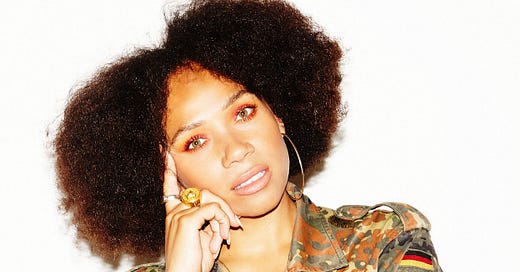Natalie Lee: “I felt a deep, guttural yearning to belong”
The blogger on the importance of role models and raising mixed children
Hi, welcome back to Mixed Messages! This week I speak to blogger Natalie Lee, found online at @stylemesunday, who is of Irish and Grenadian Trinidadian heritage. Natalie’s online presence is unapologetic, powerful, positive and so many more adjectives synonymous with amazing. I’ve long loved her work, so was excited to explore the journey she’s been on with her identity.
How do you define your ethnicity?
My mom, who was born in England, has Irish parents, and my dad was born in Trinidad, with Grenadian Tridadian parents.
I’ve had quite a hard time describing my own ethnicity, which highlights the struggle I’ve had with my identity as a mixed-race person. I’m a product of the society I grew up in, so half-caste was a term that was used a lot. Now, I tend to adopt what other people call me. At the moment, it’s mixed-race. I know some people prefer mixed-heritage, but it doesn’t roll off the tongue as well.
Language is always changing, and whether we settle on something that everyone's happy with, I doubt very much. It would be lovely for people to not see me because of how I look and see me for who I am.
Did you have access to both Irish and Trinidadian culture growing up?
My mum’s parents disowned her when she had me, so I didn’t have much of a relationship with those grandparents. I still feel aggrieved that that side of my family didn’t accept me, given the prejudice they experienced when they came to England. My dad wasn’t really around much when I was a kid, so I didn’t feel connected to either culture.
I’ve definitely suffered with a lack of belonging or community. From my white side, I’m too Black; my Black side, I’m too white. You never know where to place yourself, which can feel really lonely. Having sisters helps, as they’re mixed as well. It’s nice to share experiences with people who understand.
Has accepting yourself been a journey?
Massively. As a kid, I wanted long, straight hair, blue eyes and white skin. Now, I feel sad for that child. I didn’t feel accepted – there was a deep, guttural yearning to belong.
Part of that was wanting to be like my mum, the only role model I had at the time. The lack of Black role models in the media must have compounded that. Even now, Black inclusion can be tokenistic, with brands ticking the ‘Black box’ with a mixed-race person. It infuriates me to see light-skinned people be more accepted.
Have you spoken to your children about their own mixed identity?
I asked my daughter how she identified a few weeks ago and she struggled to define it. I think she identifies as white.
I try hard to show my girls representation and highlight that being different is something to celebrate. I point out Black and brown people on magazine covers and seek out books that they can identify with, and learn about their history from. I think it’s really important to discuss race with them; we haven’t got the luxury not to.
Do people have expectations about you because you’re mixed-Black?
People always assume I can sing and dance, but I’m the worst singer. You have to decide whether to live up to the expectations people have of you, or to disappoint them. Sometimes it’s hard to extrapolate whether the labels are ones that you’ve been given, or ones that you’ve placed on yourself; it can be a self-fulfilling prophecy. Talking to a therapist who understands race can really help to process that.
Do you feel like mixed people can develop a sense of community?
I could ask 100 different mixed people how they identify and get 100 different answers. There’s so many different experiences, so I find it difficult to have that group mentality. Mixed people can also be very angry or opinionated about how other mixed people identify, which is ironic when we’re trying to battle against how everyone labels us.
If you could define your mixed experience in one word, what would that be?
Unbelonging. I love being mixed-race now, but that overriding feeling of not belonging has been a theme throughout my life.
Natalie is well worth a follow on Instagram and Twitter. Next week I WILL be talking to Amanza Smith, star of Netflix’s Selling Sunset. Subscribe to get Mixed Messages in your inbox next Monday!
Mixed Messages is a weekly exploration of the mixed-race experience, from me, Isabella Silvers. My mom is Punjabi Indian (by way of East Africa) and my dad is White British, but finding my place between these two cultures hasn’t always been easy. That’s why I started Mixed Messages, where each week I’ll speak to a prominent mixed voice to delve into what it really feels like to be mixed.







